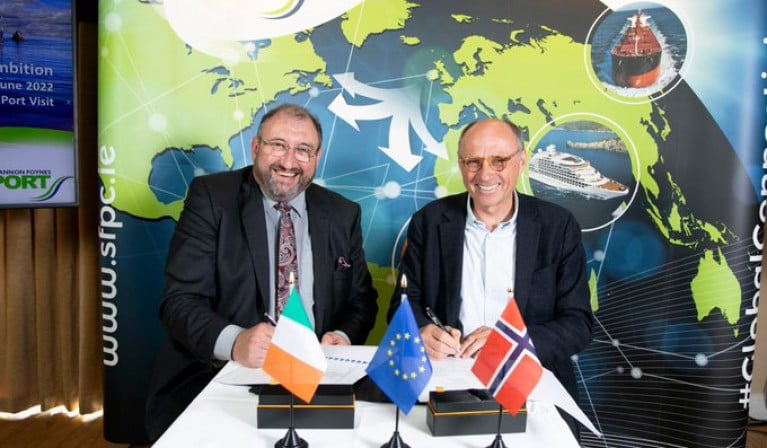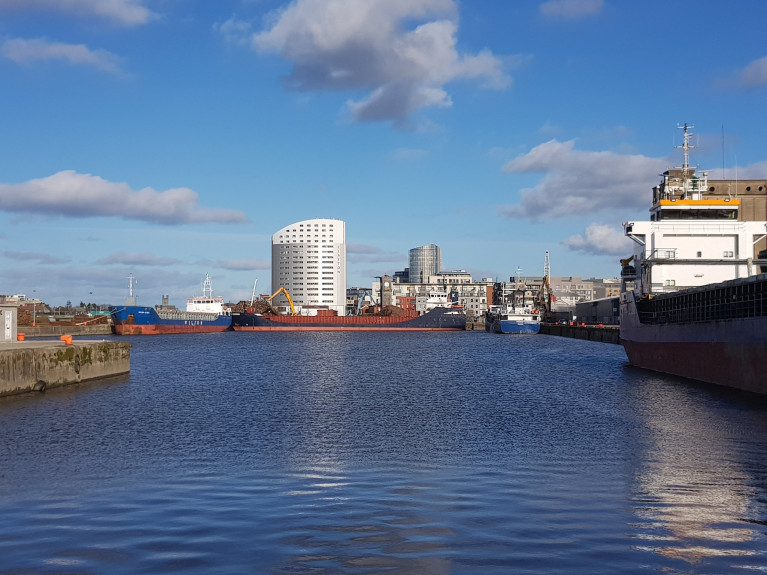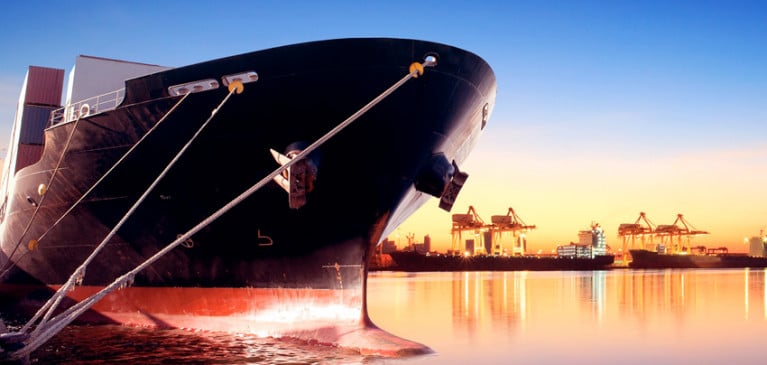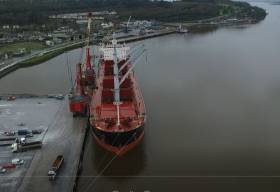Displaying items by tag: SFPC
Shannon Foynes Port Welcomes Government's Vision for Estuary's Potential in Offshore Renewable Energy and National Transport Hub
The Shannon Foynes Port Company has welcomed the backing by the government of the Shannon Estuary as a premier location for offshore renewable energy in addition as a transport hub for Ireland.
Tanaiste Leo Varadkar on Monday published the interim report of the Shannon Estuary Economic Taskforce has identified how the region can play a leading role in the transition to renewable energy by generating and accelerating the increase of floating offshore wind energy from 2030. As well as becoming a hub for Sustainable Transport Technologies and a western “Digital Gateway” to Europe.
The report identifies investment in the port of Foynes and ESB’s Moneypoint terminal, a new auction for floating wind generation in 2024, the development of clean energy such as green hydrogen, solar energy installations and anerobic digestion facilities. In addition to the Estuary becoming an international renewable energy hub, the report also identifies the potential doubling of tourism numbers through outdoor sports and adventure, business and leisure events, and cruise ship arrivals.
Commenting on the report and government backing of it, Shannon Foynes Port authority Chief Executive Pat Keating: “This is an emphatic and welcome vote of confidence from Government in the transformational potential of the estuary and a key moment in the journey towards the emergence here of a global renewable energy hub and national transport hub.
“We have been making the case here at Shannon Foynes Port for some time in relation to the potential of the estuary but, as per its welcome today for the Interim Report of the Shannon Estuary Economic Taskforce, the government is unambiguous in its support around the vision for the Estuary.”
Mr Keating added: “In our recently updated Vision 2041 masterplan by global experts Bechtel, we set out a roadmap for the estuary as a renewable energy hub of international scale as we set about harnessing Europe’s best wind regime, which exists on the west coast. That’s the prize for this region and for Ireland, one that can transform our economy and our climate change journey.
“We have a lot of work to do to make it happen, not least through investment in road, rail and port infrastructure. However, the backing today from government is a huge and essential statement of intent that we very much welcome.”
Shannon Foynes Port Company which is Ireland’s second largest port operator, has said that the Shannon Estuary Vision 2041 Masterplan needs to start now.
That’s the view of the Port's CEO Pat Keating on the masterplan which the Minister for the Environment, Eamon Ryan recently launched to highlight the unique strategic location in Ireland and Europe, to develop floating offshore wind projects in the Atlantic.
The masterplan for the Shannon estuary, a 500km2 waterway stretching from Limerick City to Loop Head in Co. Clare, is on course to become an international floating offshore wind energy hub in addition to helping the country reach its climate goals.
According to Mr Keating the masterplan will lead to significant economic impacts in the region aswell to thousands of jobs created. The project is a multi-site approach he added and with strategic development locations across Kerry, that also included opportunities at the Port of Fenit.
The story from RadioKerry includes an audio clip of the CEO commenting on the potential of renewable projects for the estuary and also along the western seaboard.
Shannon Foynes Port Company's Annual Report Reveals Port is Operating at Historically High Levels
Ireland's deepest sheltered commercial harbour, Shannon Foynes Port Company (SFPC) has reported another very strong year in 2021, with record earnings achieved for the year and profit before taxation exceeding €5.2 million for the first time.
The performance was down to a mix of recovery from Covid-19 impacts sooner than expected, a resurgent economy and the supply/demand imbalance in the energy generation sector, the report reveals.
With tonnage throughputs increasing by 16% to 10.9 million tonnes, turnover increased by 23.8% to €16 million (2020: €12.9 million). Tonnages were particularly strong in the agriculture and construction sectors, with the export of cement and related imports growing strongly.
Overall, SFPC’s general cargo terminals of Limerick and Foynes performed strongly, with year-on-year throughput increases of 9.9%, manifesting in these terminals now operating at historically high levels.
In addition to throughput and turnover growth, stringent cost management remained a core focus resulting in returning a significantly improved EBITDA margin of 47.5% (2020: 42.9%) and a historically high EBITDA of €7.6 million (2020: €5.6 million).
Commenting on the performance, Shannon Foynes Port CEO Patrick Keating said that despite challenges of 2022, he remained confident about the company’s future: “Notwithstanding the tragic events unfolding in Ukraine, we remain confident that there are significant opportunities to grow and expand the Port at the operating level. With an expanded business development function, we have identified targeted areas that will drive revenue growth over the short, medium and long term.”
Mr Keating said that Since 2011 – the base year of the company’s masterplan, Vision 2041 – tonnage at its general cargo terminals increased by 60%, even accounting for the COVID contraction. This performance is also reflected in the company’s balance sheet, with net assets increasing by 281% to €54m since 2010 and with annual net operating cashflow increasing by over 170% over the same period.
The CEO said that due to the increased tonnage throughputs projected in Vision 2041, the ongoing roll-out of the company’s investment programme is continuing at pace. Following the completion of Phase 1 at a cost of €12m, construction has now commenced on Phases II through to IV. These phases, costing a total of €33m, will involve the construction of 117m of new quay to join the East and West Jetties, infilling for associated quay set down together with the development of 38 hectares site at Foynes as a port business park. These represent the largest capital projects ever undertaken by the Company and are scheduled to complete in 2023.
He continued, the company will have a significant part to play in assisting the country’s transition to a low carbon economy due to its role as an international offshore renewable energy hub. “Our medium-term Capital Investment Program has been reviewed to ensure that the Port will have the necessary capacity for the medium term to accommodate this transition, particularly with regard to offshore renewables and deep water berth capacity,” he said.
Commenting on the results, David McGarry, Chairperson of SFPC, said: “The year recorded not only great financial success but also notable progress on several fronts with regards to SFPC’s Strategic Plan. With SFPC making strides internally, it also remains one of the foremost economic drivers for the Mid-West Region.”
Mr McGarry said that the Board had made significant progress on realising the objectives of the Strategic Plan 2021–2025. The company has now updated its objectives with the drafting of a 2022-2026 Strategic Plan, which has been delivered to the Department of Transport and the Department of Public Expenditure and Reform, with the report expected to be approved soon.
Shannon Foynes Port Company has signed a Memorandum of Understanding (MOU) with Norwegian Offshore Wind to provide a framework for collaboration on future projects.
Norwegian Offshore Wind is a cluster of 350 companies that cover the entire supply chain for offshore wind projects. Norway has been seen as a leader in such projects with 30GW of capacity expected by 2040.
Shannon Foynes is aiming to take advantage of the significant number of offshore wind projects expected to be developed around the Irish coast in the coming decades.
The agreement signed this week includes running shared events, sharing opportunities to do business and joint research projects.
For further reading, the Irish Examiner reports on the port company's signing.
Shannon Foynes Port Company Gets Over €2.3M in Co-Funding for Development Feasibility Study
Ministers at the Department of Transport have welcomed the award of more than €2.3 million in funding to Shannon Foynes Port Company under the European Union’s Connecting Europe Facility (CEF).
The co-funding will support a feasibility study to prepare for future development of a new deep-water berth and associated infrastructure at Foynes Port in Limerick.
Required infrastructure for these plans includes the construction of a bridge to link the new deep-water berth to the existing port area on the mainland. The study wills consider internal rail infrastructure.
It’s expected that this development at Shannon Foynes Port “will generate a considerably higher level of freight traffic and enhance connectivity along the North Sea-Mediterranean Corridor”, Transport says.
Reacting to the funding announcement, Minister for Transport Eamon Ryan said: “This is really positive news for Shannon Foynes Port Company and for Ireland. International connectivity is critical for our economic development.
“This feasibility study by Shannon Foynes Port Company will provide the basis for a new deep-water berth which can accommodate larger vessels and meet projected demand in the coming years. The project has also been designed to facilitate the potential role the port can play in the expansion of offshore wind energy in the future.”
Minister of State Hildegarde Naughton also welcomed the news. “Irish ports continue to benefit from financial backing by the European Union through the Connecting Europe Facility programme,” she said. “This award of over €2.3 million to Shannon Foynes Port Company represents another strong signal of the important role the port and its hinterland areas play in the EU’s TEN-T network.”
CEF funding supports projects on the EU’s Trans-European Networks in the fields of transport, energy and telecoms. The European Commission announced the selection decision of the call on 15 July and the full list of projects proposed to be funded is available online.
The news comes as the State-owned port company reported a 7.6% decline in turnover last year to €12.9 million as pre-tax profits fell from €4.9 million to €3.1 million due to the impact of the COVID-19 crisis. Afloat.ie has more on the story HERE.
Shannon Foynes Sees Profits & Revenue Slip at State-Owned Port
Shannon Foynes Port Company which is state-owned, has reported a 7.6 per cent decline in turnover last year to €12.9 million as pre-tax profits fell from €4.9 million to €3.1 million due to the impact of the Covid-19 crisis.
Chief executive Pat Keating said it was a solid performance despite the unprecedented challenges faced by the facility, which is the country’s largest bulk port for non-container freight.
Earnings before interest, taxes, depreciation and amortisation (ebitda) for the year were €5.6 million, slightly up on the prior year despite a 94 per cent decline in throughput at the Moneypoint terminal due to the coronavirus pandemic.
Overall throughput at Shannon Foynes last year totalled 9.458 million tonnes, down 1.9 per cent or 185,000 tonnes versus 2019.
The Irish Times has further details of the mid-west port's performance.
As an island nation, Ireland is dependent on ports and shipping services to transport goods, and 90% of our trade is moved though Irish ports.
Shipping and maritime transport services make a significant contribution to Ireland’s ocean economy, with the sector generating €2.3 billion in turnover and employing over 5,000 people in 2018.
The importance of Ireland’s ports and shipping services is the focus of this week’s Oceans of Learning series, with resources from the Marine Institute and Irish Maritime Development Office (IMDO).
Ireland’s maritime industry continues to grow and progress each year with Irish ports and shipping companies making significant investments.
The ports sector in Ireland is currently undergoing a number of expansions and developments — with Dublin Port’s Alexandra Basin development, the development of Ringaskiddy in Cork by Port of Cork and the development of Shannon Foynes Port.
Along with these major investments, shipping companies are also investing heavily in new tonnage, with Irish Ferries, CLdN and Stena leading new build programmes.
IMDO director Liam Lacey said: “The Irish maritime industry can look to the future with confidence. It has shown itself to be resilient and agile in responding to challenges.
“Over the past decade, it has had to respond to the challenges of the financial crisis of 2008, the uncertainty surrounding Brexit and recent challenges. Ireland’s maritime sector has continued to underpin our economy by maintaining vital shipping links for both trade and tourism.”
Oceans of Learning offers downloadable resource such as fact sheets, a quiz and posters on Ireland's shipping sector. To access the resources for this week’s series, visit Port of the Future.
For more information on Oceans of Learning, visit www.marine.ie and follow the Marine Institute on Facebook, Instagram and Twitter.
Another Record As Shannon Foynes Port Company Delivers Profit Levels
It was another record performance achieved at Shannon Foynes Port Company (SFPC) as the western port revealed its annual report for 2018.
According to SFPC, earnings before interest, tax, depreciation and amortisation (EBITDA) were €6.8million. As for operating profits in the period they remained exceptionally strong at €4.8million, €1.2million or 34% higher than five years ago, 2014. Revenue increased by 4.9%.
The company’s main ports on the Shannon Estuary, Foynes and Limerick, again achieved record tonnage levels, with an 11.7% increase in throughput. However, overall tonnage throughput was down by 5.5% to 10.7million due to a reduction of activity at privately managed terminals on the estuary.
This is the sixth year in succession that general cargo terminals have increased year on year.
Tonnages at Foynes and Limerick terminals for 2018 are some 50% higher at end 2018 than at end 2013 and exceed previous historically high tonnage levels experienced during 2006 by 11.2%.
To read more click the download here.
Shannon Port Company is Powering the Estuary Region
In the mid-west the Shannon Foynes Port Company is pursuing an unprecedented investment programme at pace to transform the Shannon Estuary into a major economic hub and act as an economic counter-pole to Dublin, consistent with Government’s National Planning Framework.
According to the Limerick Post, the port authority, which is responsible for all commercial navigation of the estuary, has a €64 million investment programme already underway that will add an additional two-thirds capacity at its general cargo terminals of Limerick and Foynes.
A new road will transform accessibility to the West Limerick town while an ambitious plan for Limerick Docklands could see up to €100m of investment in growing capacity there and maximising non-core assets such as disused buildings and unused lands.
The Shannon Foynes Port Company (SFPC) is already Ireland’s second largest port operation, handling trade valued at €8.5 billion per annum. It is also designated as a Core Network Port (TEN-T) by the European Union – essentially the EU determining that SFPC is not just of national but international importance, a status that strengthens its hand when it comes to investment confidence.
The transformational programme was launched in 2013 through Vision 2041, an ambitious plan aimed at maximising the enormous potential of the Shannon Estuary as an economic hub for the region.
For further reading click the link here.
At the European Sea Ports Organisation (ESPO) annual Conference held in Port of Livorno, Italy, three ports were congratulated today among them Shannon Foynes Port Company for achieving the EcoPorts’ environmental management standard (PERS).
The other ports that received PER status were awarded to the Port of Melilla in Spain and the Port of Ceuta, a Spanish autonomous city in north Africa neighbouring Morocco.
Isabelle Ryckbost, ESPO’s Secretary General, Eamonn O’Reilly, ESPO’s Chairman, and Sotiris Raptis, EcoPorts coordinator, handed over the PERS certificates to the ports’ representatives during the annual ESPO Conference in Livorno.
“I would like to congratulate Port of Ceuta for getting EcoPort’s environmental standard and Shannon Foynes Port Company and Port of Melilla for renewing it. European ports are clearly stepping up their efforts to communicate about their environmental policies and to engage with the surrounding citizens and community. The 2019 citizen wants to be better informed and is more engaged. Ports have to respond with more transparency regarding both externalities and environmental performance, but also have to show how the port in its different functions and responsibilities can contribute to the well-being of the city, the region and the citizen,” says ESPO’s Secretary General, Isabelle Ryckbost.
“It is encouraging that the number of ports that joined EcoPorts is continuously increasing. Environmental challenges such as climate change, air quality, noise and water quality are key priorities for European ports. EcoPorts enables ports to further improve how they deal with the environmental challenges and to communicate to local communities, policy makers, research and civil society their priorities and the progress they make,” says EcoPorts coordinator, Sotiris Raptis.
Compliance with the PERS standard is independently assessed by Lloyd’s Register and the certificate has a validity of two years. PERS is revised after the 2-year period to make sure that the port continues to meet the requirements.
You can find more information on EcoPorts’ PERS and on the ESPO Environmental Report here in addition to this link.





























































